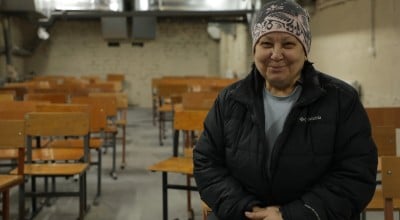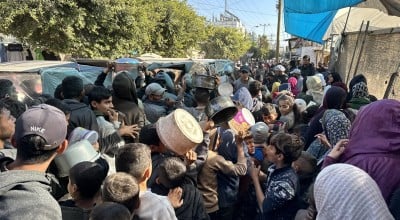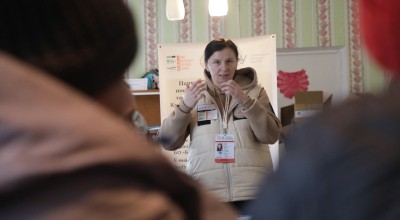
Read our 2024 annual report

Knowledge Hub
Every day, men and women around the world go to work to sustain their livelihoods. But the opportunities to earn a decent living are unfortunately skewed. We must embrace livelihood empowerment as an essential component for realising gender equality.
Economic empowerment is a term we hear often. But what does this actually mean? The Organisation for Economic Co-operation and Development (OECD) defines it as “the capacity of women and men to participate in, contribute to and benefit from growth processes in ways that recognise the value of their contributions, respect their dignity and make it possible to negotiate a fairer distribution of the benefits of growth.”
Every day, men and women around the world go to work to sustain their livelihoods. But the opportunities to earn a decent living are unfortunately skewed.
Gender discrimination puts women at a major disadvantage. Women are more likely to be in insecure, low-wage jobs, be paid less for the same work and have limited access to land and loans. In times of crisis, when vulnerable households face income and asset losses, men have more pathways out through access to social capital.
It’s clear that we need to abandon discriminatory laws, beliefs, and behaviors that inhibit vulnerable women’s ability to think beyond daily survival and embrace livelihood empowerment as an essential component for realising gender equality.
When more women work, economies grow
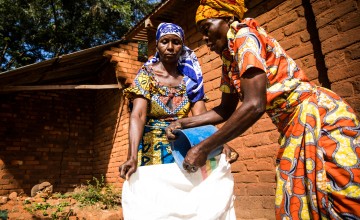
The above statement is a quote from UN Women which has clear data to back it up. Numerous studies have found that women’s economic empowerment boosts productivity, increases economic diversification and income equality, in addition to other positive development outcomes.
The economic state of the world is a cause for concern, with inflation soaring and experts predicting a global economic crash. Women can play an integral part in strengthening economies. Christine Lagarde, Managing Director of the International Monetary Fund said more women in the workplace could boost the size of some countries’ economies by 35%. “What we have observed is that when there are more women the banks’ capital buffers are larger, the number of non-performing loans is smaller and the risk indices are lower.”
When reflecting on the countries where women are most active in the workforce, Iceland tops the list with 82% female participation and also has one of the highest GDP per capita rankings.
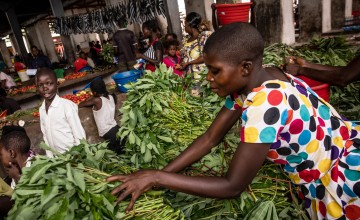
However, interestingly Global South nations much lower on the global economic scale also ranked highly. There’s an 84% participation rate for women in Malawi, attributed to the fact it is primarily an agricultural country with almost 90% of working women in this sector.
Closely interlinked with this, climate change is another factor which has a huge impact on livelihood security and seasonal opportunities, especially those related to natural resource harvesting. With rural women playing the biggest role in this sector, not economically empowering this group would have devastating and irreversible consequences.
Concern Worldwide’s work is ingrained in combating this through livelihood empowerment. ‘Graduation’ programmes are designed to address the challenges of extreme poverty by boosting income, providing access to financial services, improving people’s self-confidence, and tackling social exclusion. Alongside this, Concern is in talks of piloting ‘Greening Graduation’, specifically transitioning to the green economy through jobs that contribute to, preserve, or restore the environment.



Stawa James from Malawi is an inspiring story of it in practice. A ‘supermum’ who was trained in Conservation Agriculture, a method of farming that reduces labour, increases crop yields, and copes with drought. Putting the economic power back into her own hands, the results speak for themselves: “With this field I used to harvest one bag of maize - but now I harvest 8 bags,” she said, commenting on her land. “Everyone in this village knew I used to sleep hungry and my children would sleep hungry. Now, my life has changed in so many ways.”
In a similar practice, in one of the world’s poorest regions, Tahooua Region in Niger, Concern is implementing methods adapted to the context of dryland, to halt land degradation and boost productivity. Recognising that access to space, water and labour is limited, vertical sack gardens were introduced through demonstrations and technical trainings given to 150 local innovator farmers. The substantial increase of vegetable production in the community resulting from this led to the development of small-scale trades. Women mentioned that during months of surplus production, they managed to sell a portion to raise cash to meet other household needs.
As part of other integrated programmes, Concern is also working to support Afghan women refugees living in Pakistan. With the support of UNHCR, Concern is rolling out a new project called SALAM, meaning ‘peace’. SALAM will focus primarily on addressing the income generation challenges of 100 refugee women in two districts of Khyber Pakhtunkhwa province, by providing them access to wider markets and the opportunity to capitalise on their artisanal skills. Bilqees Bibi, who has been living as a refugee in Pakistan for thirty years shows the success after being enrolled on to a similar project, stating they “provided us with materials and designs for craft making, we carry out the work and send the finished crafts back to them. We get the money and spend it on our children’s education.”
Women in the business of impact
Bangladeshi professor and Nobel peace prize laureate Muhammad Yunus pioneered the notion of a ‘social business’, defined as one where the “objective is to solve social, economic and environmental issues affecting humanity.”
We’ve seen that women around the world harness the power to be able to nurture and grow sustainable businesses that have longevity and their microeconomic gains can start to influence macroeconomic decisions. Acording to The Independent, “Women are almost twice as likely to reach the top ranks in social enterprises as they are in mainstream businesses.”
Research has explored the many reasons why this could be, such as the fact that women often launch businesses to gain a better balance in their work and family life: wealth is not the primary focus or driver.
There are countless examples of women in the business of doing good who deserve to be celebrated as Women of Concern.
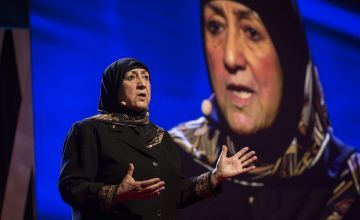
Notable women include Dr Sakena Yacoobi, the founder of the Afghan Institute of Learning focused on furthering women and girls’ access to education in the face of severe restrictions. She’s managed to rebuild an education system across the country by training teachers and health staff. An insightful woman of change, she says: “We cannot train women and forget about the men. We should train men to know the potential of women.” Concern agrees and actions this through ‘Engaging men’ activities that run alongside other gender-transformative work.
Audrey Cheng is co-founder and CEO of Moringa School, a learning accelerator headquartered in Nairobi, that teaches coding skills to Kenyan youth to increase their employability potential and enable them to thrive in the competitive digital economy. In a podcast interview discussing how she started the school she states that: “one of the biggest pain points in society is the lack of market aligned and quality education”, proving the value of recognising a societal problem and creating a simple solution. Due to her efforts, the unemployed youth of Kenya were able to upgrade their skills and as a result, increase their income by up to 350%.
Less talk, more investment in women’s livelihoods
With these impact-minded women setting the benchmark, corporates, governments, and individuals alike are recognising more than ever the value of investing in women’s earning power. Providing women with equal opportunities could create $160 trillion in wealth.
Bringing together academic and governmental entities, over the last 14 years Concern has also invested heavily in research and learning to contribute to the global evidence base on effective livelihood interventions. This includes three operational research studies in Rwanda and Burundi, in partnership with the UK’s Institute of Development Studies, plus a study in Malawi focusing on the impact of gender equality interventions, in partnership with the Trinity Impact Evaluation Unit at Trinity College Dublin.
Continue the conversation by following us on LinkedIn or signing up to our emails.
Join the Women of Concern community for the opportunity to hear from women at the forefront of creating change, on the frontlines and in some of the world’s poorest places.
Other ways to help
Corporate support
Is your company interested in working together for a common cause?
Fundraise for Concern
From mountain trekking to marathon running, cake sales to table quizzes, there are lots of ways you can support our work.
Buy a gift
With an extensive range of alternative gifts, we have something to suit everybody.
Leave a gift in your will
Leave the world a better place with a life-changing legacy.
Volunteer with Concern
The lots of ways to get involved with our work as a volunteer
School fundraising
Without the generous support from schools, we wouldn't be able to do the work that we do.


